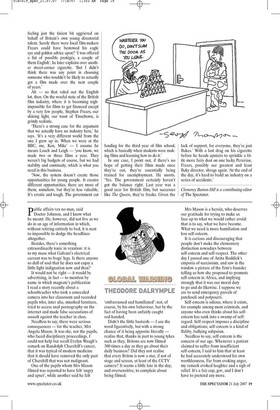Global Warming
THEODORE DALRYMPLE public affairs vex no man, said 1 Doctor Johnson, and I know what he meant. He, however, did not live as we do in an age of information in which, without retiring entirely to bed, it is next to impossible to dodge the headlines altogether.
Besides, there's something extraordinarily tonic in vexation: it is to my muse what Galvani's electrical current was to frogs' legs. Is there anyone so dull of soul that he does not enjoy a little light indignation now and then?
It would not be right — it would be advertising, in fact — to mention by name in which magnate's publication I read a story recently about a schoolteacher who took a concealed camera into her classroom and recorded pupils who, inter alia, smashed furniture, tried to access anal pornography on the internet and made false accusations of assault against the teacher in class.
Needless to say, there were serious consequences — for the teacher, Mrs Angela Mason. It was she, not the pupils, who faced disciplinary proceedings. I could not help but recall Evelyn Waugh's remark on Randolph Churchill's cancer, that it was typical of modern medicine that it should have removed the only part of Churchill that was not malignant.
One of the pupils whom Mrs Mason filmed was reported to have felt 'angry and upset', while another said he felt 'embarrassed and humiliated': not, of course, by his own behaviour, but by the fact of having been unfairly caught red-handed.
Didn't the little bastards — I use the word figuratively, but with a strong chance of it being apposite literally — realise that, thanks in part to young tykes such as they, Britons are now filmed 300 times a day as they go about their daily business? Did they not realise that every Briton is now a star, if not of stage and screen, at least of the CCTV camera? It seems a little late in the day, and oversensitive, to complain about being filmed.
Mrs Mason is a heroin, who deserves our gratitude for trying to make us face up to what we would rather avoid: that is to say, what we have become. What we need is more humiliation and less self-esteem.
It is curious and discouraging that people don't make the elementary distinction nowadays between self-esteem and self-respect. The other day I passed one of Anita Roddick's emporia of narcissism, and saw in the window a picture of the firm's founder telling us how she proposed to promote self-esteem in Africa, and implying strongly that it was our moral duty to go and do likewise. I suppose we are to send emergency parcels of patchouli and potpourri.
Self-esteem is odious, where it exists, for example among most criminals, and anyone who even thinks about his selfesteem has sunk into a swamp of selfregard. Self-respect imposes a discipline and obligations; self-esteem is a kind of flabby, bullying solipsism.
Needless to say, self-esteem is the concern of our age. Whenever a patient claimed to suffer from insufficient self-esteem, I said to him that at least he had accurately understood his own worthlessness. Far from evoking anger, my remark evoked laughter and a sigh of relief. It's a fair cop, gov, and I don't have to pretend any more.












































 Previous page
Previous page